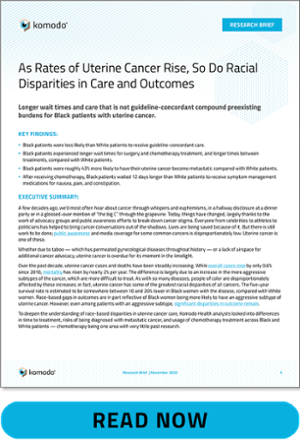As Rates of Uterine Cancer Rise, So Do Racial Disparities in Care and Outcomes

Authors: Tabby Khan, MD, MPH, Medical Director, Alex Enrique, Healthcare Data Analyst, Prawallika Gangidi, Senior Associate, Customer Success, Hannah Wang, Senior Associate, Analytics Consulting, Jocelyn Spizman, Customer Success Associate and Anna Druet, Senior Science Writer
Longer wait times and care that is not guideline concordant compound preexisting burdens for Black patients with uterine cancer.
 Over the past decade, uterine cancer cases and deaths have been quietly rising. And as with so many diseases, people of color are disproportionately affected; in fact, uterine cancer has some of the greatest racial disparities of all cancers.
Over the past decade, uterine cancer cases and deaths have been quietly rising. And as with so many diseases, people of color are disproportionately affected; in fact, uterine cancer has some of the greatest racial disparities of all cancers.
Compared with other cancers with similar numbers of affected patients, uterine cancer receives little public attention. To help elucidate racial disparities and targetable points of impact in these patients’ journeys, Komodo Health analysts looked into time to treatment, risks of being diagnosed with metastatic cancer, and usage of chemotherapy treatment across Black and White patients.
We learned that Black patients were less likely than White patients to receive guideline-concordant care, and that they also experienced longer wait times for surgery and chemo treatment, as well as longer times between treatments. Black patients waited three days longer than White patients for surgery, and seven days longer to initiate chemotherapy treatment. Black patients also waited 12 days longer than White patients to receive symptom management medications for nausea, pain, and constipation after having chemotherapy.
Uterine cancer also tended to be diagnosed at a later stage in Black patients compared with White patients — 19% of Black patients were diagnosed with uterine cancer that had already metastasized, compared with 14% of White patients. Black patients were roughly 43% more likely to have their uterine cancer be or become metastatic within one year of diagnosis, compared with White patients.
These findings are especially significant considering that Black patients are more likely to have more advanced and more aggressive forms of uterine cancer. One of the most powerful roles that new-era data and analytics can play in healthcare is in elucidating, validating, and detailing disparities in healthcare. The inequitable disease burden carried by patients of color is reflected in our comprehensive patient-level data, and is evidence of a system rife with social and systemic marginalization that is tied to worse health outcomes. In Komodo Health’s mission to reduce the burden of disease, we aim to use our data and insights to increase public awareness of trends, and bring data-driven evidence and tools for change to the stakeholders, policymakers, and public changemakers who are helping to close these gaps.
Read the full research brief here.
Read more about the role of data in fighting racial disparities in health and medicine.
To see more articles like this, follow Komodo Health on Twitter, LinkedIn, or YouTube, and visit Insights on our website.





